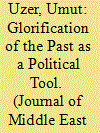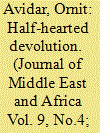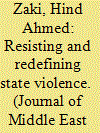| Srl | Item |
| 1 |
ID:
163738


|
|
|
|
|
| Summary/Abstract |
Turkey’s radical transformation of state and society under Mustafa Kemal Atatürk’s republican rule (1923–1938) has been subject to a gradual revision under the Justice and Development Party (AKP) government since 2002. The creation of a new state identity has been buttressed with Islamic and Ottoman discourses, which entail a reinterpretation of Ottoman history. This study analyzes the changes in modern Turkey in the last sixteen years within the context of the use of the Ottoman past in the formation of a new national identity by the AKP government.
|
|
|
|
|
|
|
|
|
|
|
|
|
|
|
|
| 2 |
ID:
163737


|
|
|
|
|
| Summary/Abstract |
Decentralization in countries around the world occurred as a form of structural revolution in redistribution of power in the 1980s and 1990s. In 2010, Kenya too went through a fundamental reform in which a new constitution was promulgated, which put into place a devolved system of government. This structural revolution has directly affected issues related to water governance in Kenya, but reflects similar trends and changes established internationally. This article reviews the devolution process in Kenya and its consequences. It delves into water legislation from the perspective of devolution and analyzes how devolution functions and objectives were formed with the new regulations. Finally, this study analyzes how policies and their ramifications are manifested on the ground in Siaya County in Western Kenya. The author applies mixed methodical methods of document review of the Constitution of Kenya 2010 and of the Water Acts 2002 and 2016 as well as open-structured interviews with relevant stakeholders and observations conducted in Siaya County on two field trips between July 2017 and February 2018. A close examination of the impact of devolution on the sustainable access to clean water in Siaya County will demonstrate that the transition to devolution and compliance with the 2016 Act have led to the surfacing of a host of problems including inadequate governance.
|
|
|
|
|
|
|
|
|
|
|
|
|
|
|
|
| 3 |
ID:
163740


|
|
|
|
|
| Summary/Abstract |
This study traces the progress of the contacts between Israelis and Kurds—two non-Arab regional minorities intent on self-government and encircled by enemies—in their earliest stage of development, from the two peoples’ first flirtations to the preliminaries of the Israeli-Kurdish entente against Baghdad in the 1960s and 1970s. Irregular in occurrence and anticlimactic in outcome, these early contacts unfolded over three decades in the form of unrequited overtures, dud proposals for cooperation, and stillborn bids for an alliance. Yet for all of these dead-ends, the path along which these early contacts proceeded was, as this article establishes, pursued by the very same Israelis and Kurds, impelled, in turn, by the very same strategic logic, that would lead the two peoples in due course into an alliance.
|
|
|
|
|
|
|
|
|
|
|
|
|
|
|
|
| 4 |
ID:
163739


|
|
|
|
|
| Summary/Abstract |
For decades, thousands of Tunisian women suffered from systematic sexual violence at the hands of state agents, with many now seeking justice and public recognition of those crimes following the 2011 Jasmine revolution. While Tunisia’s process of transitional justice created an opportunity to construct new narratives of women's rights, it paradoxically created more barriers to holding the state accountable for its violations, mainly because of the centrality of the state hegemonic narratives of women’s rights in the legal and political process of transitional justice. In this article, I investigate the limitations and gendered paradoxes inherent in the process of transitional justice in post-revolutionary Tunisia. Focusing on the Truth and Dignity Commission established in 2014, I explore how gender-based violence featured into the formal procedural mechanisms of transitional justice, and the degree to which women’s voices were incorporated into the making of the rules and procedures related to providing compensations and rehabilitation to victims of gender-based violence. Furthermore, I analyze how official narratives of gender-based violence committed by the state enforced traditional gendered categories, perpetuating the state's prerogative powers over its citizens and reflecting the requirements of Tunisia's fragile political settlement. Through such an approach, I hope to develop a deeper understanding of the role that nationalist narratives on women’s rights play in the context of transitional justice and suggest viable recommendations for building accountable state institutions that could effectively address gender inequality as an essential goal of democratic governance.
|
|
|
|
|
|
|
|
|
|
|
|
|
|
|
|